|
|
|
Sort Order |
|
|
|
Items / Page
|
|
|
|
|
|
|
| Srl | Item |
| 1 |
ID:
145481
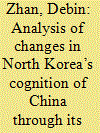

|
|
|
|
|
| Summary/Abstract |
This paper compares the coverage of China, Russia and the United States by the Korean Central News Agency(KCNA)from October 1, 2013, to February 29, 2016. It also verifies the results by the Rodong Sinmun (RS) coverage of the three countries from January 1, 2015, to February 29, 2016. The analysis reveals that the North Korean media has reduced its coverage of China significantly and constantly since November 2013, and that the media have turned to reporting negatively on China, with almost no positive coverage since July 2014. Considering that KCNA and RS are North Korea’s official mouthpieces, this change may indicate that North Korea’s leadership has changed its cognition of China from a friendly country to an unfriendly country, if not a quasi-hostile country.
|
|
|
|
|
|
|
|
|
|
|
|
|
|
|
|
| 2 |
ID:
145487
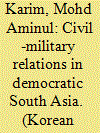

|
|
|
|
|
| Summary/Abstract |
The aim of this paper is to conceptualize a comparative framework on civil-military relations (CMR), at both political and strategic levels, in the context of major South Asian states such as India, Pakistan, and Bangladesh. There are complexities involved in framing and explaining power relations between political/ bureaucratic and military elites in these countries. Methodology used in this paper is basically content analysis, interviews, and observations made, and inferences drawn by the author himself, given his professional experience. The paper concludes there are both similarities and dissimilarities in such relations between democratic and quasidemocratic or between liberal and illiberal polities.
|
|
|
|
|
|
|
|
|
|
|
|
|
|
|
|
| 3 |
ID:
145479
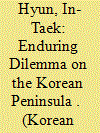

|
|
|
|
|
| Summary/Abstract |
This paper sheds new light on the North Korean nuclear conundrum, which has long been the source of security dilemmas on the Korean Peninsula, and South Korea’s strategic choices with regard to it. In doing this, this paper deals with four research questions: 1) How serious are North Korea’s nuclear and missile capabilities?; 2) What are the implications of international sanctions and countries’ positions?; 3) Can and will South Korea and the international community stop the North Korean nuclear program successfully?; and 4) And if not, what should South Korea do? This paper indicates that in the wake of North Korea’s fourth nuclear test and subsequent missile test, North Korea’s nuclear Pandora’s Box is almost about to open. It urges that if it indeed opens, it would completely change the strategic environment of the Korean Peninsula and Northeast Asia. This deep frustration and a sense of urgency have driven South Korea and the international community to impose stronger and tougher sanctions against North Korea than before. However, this paper argues that multiple factors––South Korea’s limited ability; the escalation of the U.S.-China global and regional rivalry; the strategic consideration of countries involved, especially China; and North Korea’s tenacious survival strategy—engage in strong pessimism, leaving the North Korean nuclear situation unresolved. Therefore, on the one hand, South Korea has to make every effort to denuclearize North Korea until the last minute, exhausting every possible option and means. However, on the other hand, it has to prepare for a worst-case scenario. This paper points out that South Korea’s exit strategy should be a “strategy of delicate deterrence” that is a comprehensive strategy of deterrence to combine military, political and diplomatic means.
|
|
|
|
|
|
|
|
|
|
|
|
|
|
|
|
| 4 |
ID:
145482
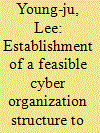

|
|
|
|
|
| Summary/Abstract |
The paper discusses ways of establishing a feasible cyber organization for enhancing cyber response capabilities in defense of the ROK. To prepare for the rise of cyberspace as a war-combat domain, together with the realization that cyberspace is indispensable in fulfilling operational requirements, it is essential to search for and establish a new, suitable organization for cyberspace operations. To achieve this, the author suggests a design of an organization based on the so-called “three-party authority,” the ROK’s way of managing cyberspace, the difference in each echelon’s accountability for the fulfillment of the operational requirements—mission accomplishment for its commander as well as the characteristics of cyberspace. The article also presents validation and verification of the suggested composition of the cyber organization suitable for defense of the ROK to identify its pros and cons.
|
|
|
|
|
|
|
|
|
|
|
|
|
|
|
|
| 5 |
ID:
145480
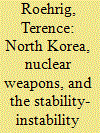

|
|
|
|
|
| Summary/Abstract |
As the chances wane of North Korea relinquishing its nuclear weapons, how will this capability affect its behavior and tolerance of risk? Increasingly, scholars are using the Cold War concept of a stability-instability paradox to describe the possibility of Pyongyang being more willing to tolerate risk and conduct increased numbers of lower-level provocations under the cover of nuclear weapons. North Korea has long been tolerant of accepting a great deal of risk prior to its acquisition of nuclear weapons, and it is not clear if nuclear weapons have increased that tolerance––or as some have argued, it may actually decrease North Korea’s risk tolerance, making it more cautious. While North Korea’s rhetorical barrages in recent years have exceeded past outbursts, and weapons testing has done a great deal to rattle nerves, much of this can be viewed as part of its deterrence-posturing and less of the more aggressive, status quo-altering actions predicted by the stability-instability paradox.
|
|
|
|
|
|
|
|
|
|
|
|
|
|
|
|
| 6 |
ID:
145486
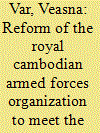

|
|
|
|
|
| Summary/Abstract |
Cambodia has recently recovered from decades of civil conflict, and remains one of the poorest countries in the region. The current political stability and peace in Cambodia has provided great opportunities for the Royal Government of Cambodia (RGC) to focus on national reconstruction and economic development. The Royal Cambodian Armed Forces (RCAF) is currently at a major crossroads with respect to reforming its forces, which contributes to the government’s grand strategy called the “Rectangular Strategy.” This strategy lists reform of the RCAF as one of the outcomes needed to achieve national strategic objectives. It states that the RGC is strongly committed to military reform with a goal of rebuilding the armed forces to an appropriate size and quality to be able to defend the country in wartime and peacetime. Although the RCAF has achieved its missions very satisfactorily, it faces significant challenges with respect to its reform programs. The purpose of this paper is to identify the major military reform challenges confronting the RCAF and examine the current policy being pursued by the RGC, and then it will propose policy framework options to address a range of current and increasing problems and challenges to RCAF reform.
|
|
|
|
|
|
|
|
|
|
|
|
|
|
|
|
| 7 |
ID:
145489
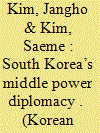

|
|
|
|
|
| Summary/Abstract |
This paper suggests that South Korea’s middle power identity can take on a more distinctive shape, and fulfill concrete goals, if it adopts a model of agenda-partner based leadership in which it demonstrates agenda-setting capabilities in tandem with strategic partner selection. Its middle power initiatives have been one way for South Korea to promote its national interests amidst a volatile geopolitical environment. However, its present middle power track has often lacked direction and sophistication. This is largely due to poor agenda selection, oftentimes choosing agendas that are too broad in scope or too rigid to coordinate with potential partners. Refining South Korea’s middle power diplomacy by directing resources to specific agendas, and collaborating with selective partners, will not only enable South Korea to secure a niche among myriad agendas, but also make it possible to build strategic, as opposed to tactical, coalitions.
|
|
|
|
|
|
|
|
|
|
|
|
|
|
|
|
| 8 |
ID:
145488


|
|
|
|
|
| Summary/Abstract |
With Taiwan gradually losing its grip on air-and sea-superiority over the Taiwan Strait in recent years, China’s increasing Anti-Access/Area Denial (A2/AD) strength and nuclear capability that is now capable of threatening the U.S. homeland have created many doubts about the U.S. security commitment to Taiwan. On the other hand, it has made China begin to believe that it may be able to resolve the cross-Strait situation with military assertiveness. The Ma Ying-jeou administration has long relied on the concept of defensive defense and cross-Strait military trust, hoping essentially for cross-Strait reconciliation. However, with China’s unwillingness to forgo the possibility of using force in cross-Strait affairs; and the growing presence of its offensive capabilities, defensive defense strategy cannot fully ensure Taiwan’s security. Taiwan may have to develop an effective and independent deterrence capability should it wish to maintain autonomy in the future, but certainly the actual effects and potential difficulties of this policy goal are highly debatable. If Beijing continuously fails to recognize the de facto existence of the Republic of China (ROC), then its push for political negotiation based on the socalled cross-Strait military mutual trust system and peace accord may unfortunately be deemed as nothing but political propaganda, and will not offer a true solution to Taiwan’s security dilemma.
|
|
|
|
|
|
|
|
|
|
|
|
|
|
|
|
|
|
|
|
|